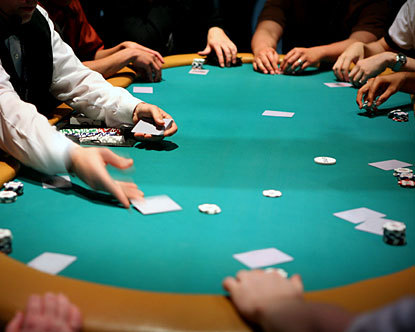






Study: You're Like A Pigeon When You Play PokerWarwick University Team: 'Gamblers Are Greedy Bird-Brains' |
|
|
 Well, this is an odd one—but may be of some use to those interested in understanding the psychology going on at their poker table.
Well, this is an odd one—but may be of some use to those interested in understanding the psychology going on at their poker table.
Researchers at Warwick University in the U.K. have come out with comments that claim there is a parallel between the brains of people while they gamble at a casino and the brains of pigeons in the perpetual search for food.
“Gamblers are greedy bird-brains,” the Aug. 27 press release stated boldly.
Basically, humans and pigeons were put through a series of chance games that involved making high-risk decisions for high-reward payoffs. Both groups of test subjects, when presented with an equal number of higher-risk-higher-reward options and lower-risk-lower-reward options, were 35 percent more likely to take the bigger gamble. This was despite the fact that a lower risk option provided a guaranteed, albeit smaller, reward.
The experiment also indicated that both humans and pigeons were equally impacted by their previous, and most recent, gambling experiences. In other words, if they won big, they most likely would continue to gamble at the higher threshold.
We’ll let you decide for yourself if this sounds valid.
“Both humans and pigeons were shown to be less risk averse for high rewards than they were for low rewards and this is linked to our past memories and experiences of making risky decisions,” said Dr. Elliot Ludvig, a psychologist at Warwick and lead author of the new study—published this week in the peer-reviewed journal Biology Letters.
“When people gamble, they often rely on past experiences with risk and rewards to make decisions,” Ludvig explained. “What we found in this study is that both pigeons used these past experiences in very similar ways to guide their future gambling decisions. Any big wins we’ve had in the past are memorable and stand-out when we are making our decision to gamble again.”
Could this be used as a way to scientifically explain why, for example, after hitting a couple of flush draws in a row, another draw seems more tempting to chase, even if the math isn’t quite right? Or, could this help shed light on why it’s very tough for many serious poker grinders to move down in stakes when experiencing a downswing?
He added that “birds are distantly related to humans, yet we still share the same basic psychology that drives risk-taking.” In other words, “similar evolutionary pressures.”
This isn’t the first time pigeons have been linked to the world of gambling. Last month, PETA accused an Oklahoma firm of supplying pigeons to a Taiwanese gambling syndicate for use in what PETA says is the cruel sport of illegal bird racing.
(H/t bignewsnetwork.com)
